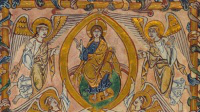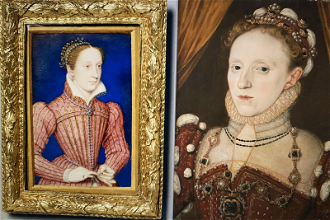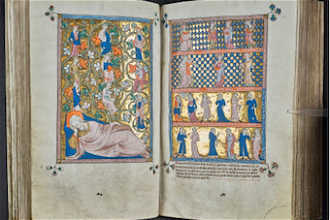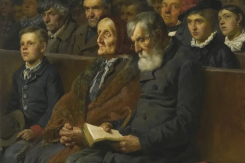Windows onto Heaven: exhibition of manuscripts at British Library

King Edgar & Christ
Royal Manuscripts: The Genius of Illumination showcases 150 manuscripts from the British Library's collection (and a few loaned from elsewhere) which had previously been owned by English monarchs.
Manuscripts are not the ideal subject for a blockbuster exhibition; they were created to be viewed at close quarter, and at length - hardly possible given the necessary constraints of low lighting and glass cases, and the fact that there are 150 volumes to see but each can only be open on a single page. Thus, unless one has extraordinary stamina, it will pay to be highly selective in which manuscripts to concentrate on (following, or avoiding, the audio guide could be helpful strategies).
The exhibition is divided into six sections: Edward IV, Founder of the Old Royal Library; The Christian Monarch (about the commissioning of Christian texts); Royal Identities (genealogies, chronicles, coronation books); How to be a King (moral manuals drawing on Christian and Classical traditions); The World's Knowledge (geographical and astrological compendia, early medical texts); The European Monarch (manuscripts made on the continent). There is not, then a continuous narrative, and essentially the exhibition really is about the manuscripts themselves. But what wonderful manuscripts they are, and whilst the viewing conditions may not be ideal, this opportunity to see these treasures is not to be missed.
Sacred themes do, of course, feature prominently - from illuminated Bibles, to liturgical books, to lives of saints. Particularly intriguing is the illustration which appears on the exhibition poster. It is taken from the first volume of a Biblia historiale, produced in France in 1411, and depicts "God Creating the Heavens and the Earth." Creator towers over the green earth on which he stands; behind Him are deep blue heavens, which in fact consist of angels; a white void separates the earth and the heavens (Genesis 1:6-7), and the Creator is framed in a fiery mandorla, which is also formed of angels. He holds a pair of dividers, emphasising his role as architect of the universe. This is an astute choice of poster image, reflecting the notion that the artists of the creators of these manuscripts were participating the activity of the Creator. It must also be a deliberate reference to Eduardo Paolozzi's Newton, After Blake (1995), the giant bronze sculpture which dominates the forecourt of the British Library.
As the name indicates, Paolozzi's piece is based on a print by William Blake (dated 1795; an impression is held at the Tate) of the scientist Isaac Newton. Newton is crouching down, looking down the arms of a pair of dividers to measure something on the ground. His Newton is sitting on a effervescent rock-face, but only looks at his dividers. For Blake, to see the world through a pair of dividers was short-sighted - we should, he insisted, seek to be delivered from what he called "single vision" or "Newton's sleep." Blake's image was probably also a reference back to the tradition of depicting God as architect of the universe - another of his most famous images The Ancient of Days (1794) depicts this subject. Blake wants us to take the long view, to see the world through God's wide dividers, not Newton's narrow ones, and we can do that, according to Blake, through the imagination - "To see the world in grain of sand, And a heaven in a wild flower, Hold infinity in the palm of your hand, And eternity in an hour." Blake's theology may be unorthodox, but his encouragement to look with our imagination at Creation is a useful idea to take into this exhibition - like Blake's wild flowers, these manuscripts can be a windows onto heaven.
Royal Manuscripts: The Genius of Illumination is at the British Library until 13 March 2012.
For information and tickets, visit: www.bl.uk/whatson/exhibitions/royalman/index.html





















